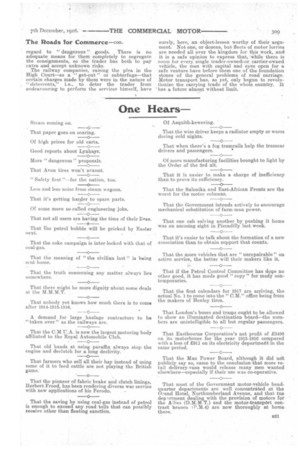One Hears
Page 3

If you've noticed an error in this article please click here to report it so we can fix it.
Steam coming on.
That paper goes on soaring.
Of high prices for pld carts.
Good reports about Lyxhayr.
More " dangerous " proposals.
That Avon tires won't avaunt.
"Safety first "—for the nation, too.
Less and less noise from steam wagons. That it's getting harder to spare parts.
Of some more so-called engineering jobs.
That not all users are having the time of their lives.
That the petrol bubble will be pricked by Easter next.
That the coke campaign is inter-locked with that of coal-gas.
That the meaning of "the civilian last" is being sent home, That the truth concerning any matter always lies somewhere.
That there might be more dignity about some deals at the M.M.M.T.
That nobody yet knows how much there is to come after 1914-1015-1916.
A demand for large haulage contractors to be " taken over" as the railways are.
That the C.M.U.A. is now the largest motoring body affiliated to the Royal Automobile Club.
That old hands at using paraffin always stop the engine and declutch for a long declivity.
That farmers who sell all their hay instead of using some of it to feed cattle are not playing the British game.
That the pioneer of fabric brake and clutch linings, Herbert Frood; has been rendering diverse war service with new applications of his Ferodo.
That the saving by using coal-gas instead of petrol is enough to exceed any road tolls that can possibly receive other than fleeting sanction. Of Asquith-kewering.
That the wise driver keeps a radiator empty or warm during cold nights.
That when there's a fog tramrails help the tramcar drivers and passengers.
Of more manufacturing facilities brought to light by the Order of the 3rd ult.
That it is easier to make a charge of inefficiency than to prove its sufficiency.
That the Salonika and East-African Fronts are the worst for the motor columns.
That the Government intends actively to encourage mechanical substitution of farm man power.
That one cab salving another by pushing it home was an amusing sight in Piccadilly last week.
That it's easier to talk about the formation of a new association than to obtain support that counts.
That the more vehicles that are " unrepairable" on active service, the better will their makers like it.
That if the Petrol Control Committee has deve no other good, it has made good " copy " for maify contemporaries.
That the first calendars for 1917 are arriving, the actual No. 1 to come into the "CM." office being from the makers of Henley tires.
That London's buses and trams ought to be allowed to show an illuminated destination board—the numbers are unintelligible to all but regular passengers.
That Eastbourne Corporation's net profit of £3490 on its motorbuses for the year 1915-1916 compared with a loss of £911 on its electricity departmetit in the same period.
That the Man Power Board, although it did ndt publicly say so, came to the conclusion that more retail delivery-vans would release many men wanted elsewhere—especially if their use was co-operative.
That most of the Government motor-vehicle headquarter departments are well concentrated at the Grand Hotel, Northumberland Avenue, and that the dep7.rtment dealing with the provision of motors fer the Allies (D.M.M.T.) and the motor-transpOrt contract brancn IT'.114.4) are now thoroughly at home there.






















